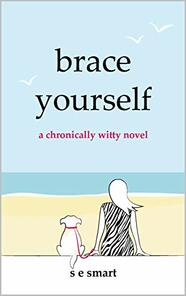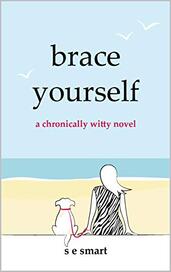 But when test results found there was nothing wrong, over the years life just went on. I was a bit sickly, accident-prone, broke bones, turned my ankle over, had sore throats and earache, and I fainted, but I wasn’t always at the Drs. I’d complain of an issue, mum would take me, they would investigate and find no cause, so I wouldn’t mention it again. How did I know everyone didn’t feel the same way? Things were explained as growing pains, clumsiness, and as being ‘normal for a teenage girl’. I know now that these are familiar tales - there will be plenty of people nodding along! When I was 16 my dad died, and I got glandular fever. I went to the GP feeling terrible, with significant weight loss, and was told I was depressed. It took months for anybody to test my blood to find that I had a virus and treat it. This ‘depression’ label stuck, I think, and forever more blinded my GPs. It took a while, but I eventually recovered from the long-untreated glandular fever, and again life went on. I had an inkling I wasn’t quite like everyone else - I couldn’t keep up when I went bike riding with friends, I seemed to hurt myself a lot (Sarah’s at A&E again!), I often had some limb or other strapped up. But I was energetic, I never stood still, I loved to dance, I had ambition, and I was doing well. I moved in with my first boyfriend, we got married, we worked hard and saved up, bought a house (I found out I was a dab hand at DIY), and eventually we had a beautiful son. Nobody would think for a moment that I was carrying around a hidden illness, trying not to complain about aches and pains. After my son was born I snapped back into my size 8s, took him on long walks in his pushchair and felt as healthy as I had ever been, now in my mid-30s. I wasn’t bothered by the night-time feeds – he was a good baby and waking up to feed him was a complete pleasure. I loved being a mum, and looking back, I felt quite well – and happy. Sadly, our long relationship broke down and life turned on its head. Soon afterwards, I started to become unwell again, with constant strep throat, fevers, and exhaustion like I had never known. I didn’t know that the Drs had decided I had post-natal depression (I saw it on my notes years later and refute this wholeheartedly) and while I was returning to my GP trying to explain how unwell I felt, they were so certain I was just sad that I was given antidepressants and asked to complete suicide-risk surveys. The fainting was ‘panic attacks’, they said. But after my 11th bout of strep throat in a year, they decided to take my tonsils out. I’ll never know whether it was the recurrent strep, or the year of taking antibiotics, or if it was the falls that put me in plaster, or the contrast MRI I was given when a couple of breaks didn’t heal well, or the anaesthetic for the tonsillectomy, or the stress and upset of starting life all over again after my marriage broke down, but the decline in my health that year was significant. I went from having niggling symptoms to being really quite unwell. I was passing out so often that I was eventually sent for tests, having had to surrender my driving licence, and was diagnosed with Postural Tachycardia Syndrome (POTS) – an explanation which came as a relief, rather than a worry, but came with no treatment. I tried to settle down with that diagnosis, but after a few more years I was sure that there was something else going on – POTs just didn’t seem to explain everything. I was getting nowhere with the GP who had decided I was just sad, so I saw a private Rheumatologist who diagnosed Fibromyalgia. These two diagnoses combined were enough to give me some understanding – that following the perfect storm some years before, life had changed, and I had to change with it. Some years later, struggling to live anywhere near a normal life, I found myself in front of a new GP, who with fresh eyes came up with a new theory. I was referred to a specialist who diagnosed Ehlers-Danlos Syndrome. It was also discovered that I had a small ADS (hole in the heart). Finally, now in my mid-40s, I had the truth. That year of sickness had triggered the hidden genetic illness to reveal itself in its newer, more aggressive form. So, to today. What IS it like to live with chronic illness? You know what – it’s OK. It’s still a life! I’ve had the relief of a diagnosis for a few years now so I know what I am dealing with. There’s not a whole lot you can do about it – I have medication for the POTs now, but other than that there is no cure. I take pain relief, I take things to help with the common comorbidities (digestion issues, deficiencies, anaemia, allergies etc). But I know now that my pain and fatigue are real. I work part time, term time only in a lovely little job. I work 8:30am until 3pm three days a week, and by 3:45pm I am back in bed. My alarm wakes me at 5:30pm when I get up and make us food - something that I can just pop in the oven with a timer on. On the two days a week that I don’t work, while my son is at school, I go back to bed for the day. My week follows a pacing plan which just about works – it’s a struggle and fatigue is crippling, and pain is debilitating, but I’m still here. I see a physio for back, hip and shoulder pain thanks to subluxating joints, but there isn’t much they can do. I use braces to steady whichever joints are causing the most bother at any particular time. Not many people at work know – I prefer it that way – so I can just be me, and not sickly Sarah… I remain single, and that is largely out of choice. It means that I don’t have to apologise for my bad days, and I don’t have to feel ‘cajoled’ into doing things I can’t really manage. I don’t go out-out any more, we stay at home at the weekend. I don’t go shopping, we don’t eat out – many might think we live a bit of a pointless existence because these things are out of reach, but you don’t miss what you don’t enjoy. Fatigue, pain and fear (anxiety after fainting in public and being scooped up by ambulance several times) all take the enjoyment out of what other people do without a thought. Sometimes, in the school holidays, we might manage a gentle walk. Last summer we went out for a stroll around a nearby fishing lake and we talked, and enjoyed the fresh air, but that was in the knowledge that I had recovery time available for the week or so afterwards. There is always pay-back, and I knew I would be overwhelmingly fatigued and that I would be in pain. I can only deviate from my pacing routine a little before it fails me. I don’t qualify for health-related benefits (I didn’t score high enough on my PIP assessment) so I have to maintain enough energy for my job, lurching from school holiday to school holiday when I can up my rest, ready for the next half term. But there are still many brilliant things in life – my friends, who are always available on messenger if I fancy a chat, and my family, along with my handsome, kind, clever and funny son… and I have found ways to seek pleasure in simple things. Sitting in the garden (albeit in the shade thanks to my sun allergy – Mast-Cell Activation Syndrome is common for EDS patients!) is a lovely way to spend some time. I read a lot, when I can focus, and there is a whole other world in the pages of those books. I like to watch TV, and films – always lying down on my sofa as I only ‘sit’ upright when I am at work. And last year, over the school summer holidays, I grabbed my laptop and wrote a book! I didn’t know if I could do it, but I wrote in short bursts and self-published a novel about – guess what… a character who is chronically ill. It was great therapy, having only received my diagnosis a couple of years beforehand it helped me to process my life so far. But I also wrote it for other people who may have similar experiences and who may feel alone with them. I’d noticed on forums how excited people became if EDS, POTs or similar conditions were mentioned on TV, or in a magazine article. It was validation, and community. So, I wanted to write a novel, not so much about chronic illness, but about somebody who happens to have chronic conditions. It is own voice, and this might sound implausible, but it is also (I hope) funny! Because I never lost myself, or my sense of humour, and I wanted readers to see beyond the illness to the character. To know that behind every diagnosis is a normal person, doing their best to live a normal life.  I wanted to shine a light on the often-hidden issues of living with chronic illness by writing them into a rom-com – easy reading for us fatigued folk who often struggle with brain-fog, but relatable, honest, and fun. The title Brace Yourself is a nod to the various braces and supports people with connective tissue disorders rely on, and the cover features a hint of zebra pattern, as people with ‘rare’ conditions are known as medical zebras. It is a ‘call’ to my people, and I have been lucky enough to receive some lovely messages from readers who have been on similar journeys. Sarah lives with her teenage son in East Devon, where she works part-time as a communications officer, and she recently wrote an indie-published book featuring a character with chronic illness: Brace Yourself: a chronically witty novel.
1 Comment
Annette Marslen
5/10/2019 04:11:47 pm
Loved “Brave Yourself”. It is a book about a serious subject written with a delightfully deft touch and an underlying humour that allows us see chronic illness in all its awfulness without removing hope for a happy existence. I hope Sarah considers writing more books as her writing style is fantastic!
Reply
Leave a Reply. |
My latest writings, and thoughts on disability, mental health and young-adult lit. Archives
September 2022
|

 RSS Feed
RSS Feed